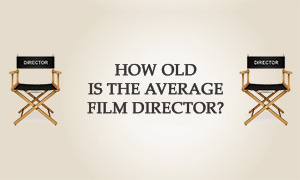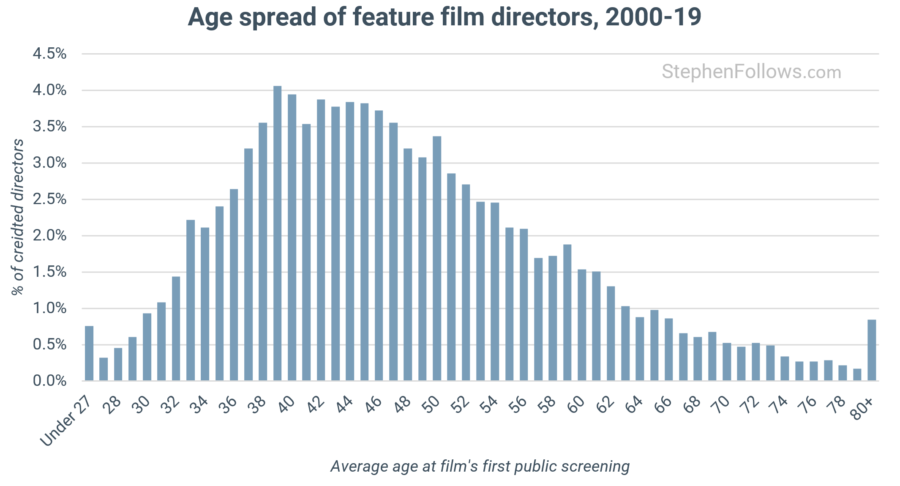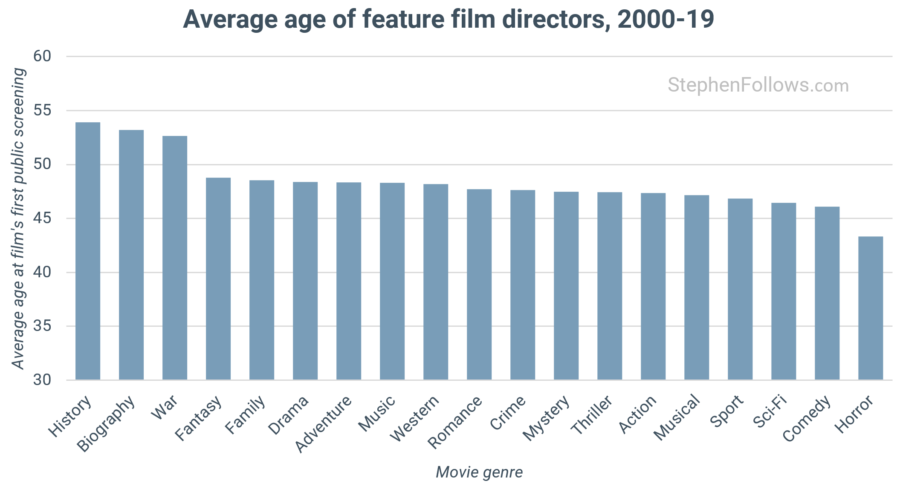How old is the average film director?
Five years ago I researched the average age of top Hollywood directors. Since then, I have received a number of requests to update and extend the study.
Today I am sharing what I found when I looked at the directors behind all theatrically released movies (not just top grossing) and dug a little deeper into the data.
How old are film directors?
Across all live-action fiction feature films released between 2000 and 2019, the average age of the director was 47.5 years old.
If we split this down by year, we can see that the average age of directors has been rising. Directors of films released in 2000 had an average age of 45.0, whereas two decades later it had risen to 50.6.
Just over half of all directors were between 30 and 46 years old when their films hit cinemas for the first time. Under 30s account for just 2.1% of directors - the same percentage as those aged 75 and over.
Why is the average age of film directors rising?
Some of the rise in the average age of directors could be down to a change in the types of films hitting the big screen. The last few decades have seen an increase in the number of films released and a decrease in the number of first-time directors as a percentage of all films released. In 2000, there were 390 films released, of which 29.5% were by first-time directors, whereas in 2018 there were 480 films released, of which just 16.7% were directing debuts. Given that time is linear, it stands to reason that fewer first-timers will mean a rise in the average age.
Between 2000 and 2019, the average age of a first-time director was 40.0 years old, compared with 48.8 for repeat directors.
Age differences between genres
Before I go, let's have a look at how genre affects the average age. Historical and biographical films have the oldest directors (53.9 and 53.2 years old, respectively), with comedy and horror movies having the youngest (46.1 and 43.4 years old, respectively).
Notes
This study looks at the officially credited directors of all live-action fiction feature films which were released in US cinemas between 1st January 2000 and 31st December 2019. I opted to exclude data from 2020 as the lack of theatrical releasing makes it hard to ensure I'm looking at a consistent type of film.
In today's research, a "first time director" is someone who receives a live-action fiction feature film directing credit for the first time in their career. It's certainly possible (even likely) they have previously directed shorts, television and other media types.
Ages were calculated by comparing publicly available dates of birth at the date of the film's first public screening anywhere in the world. In the vast majority of cases this was the North American theatrical run but in some cases it meant a festival premiere.
I was able to discover at least a year of birth for 70.03% of directing credits over the period studied. I think it's fair to assume that the remaining unknown ages are more likely to skew younger than older as the more famous a director is, the more likely it is that their date of birth will be shared publicly. This means we're more likely to know biographical details of people who have been around for a while.
Epilogue
If you're working towards becoming a film director, don't take too much from these results. Each journey is unique and right now the film industry is changing in a number of ways. These results are an interesting rule of thumb to see how long it may take to get to helm a film but are not a hard-and-fast rule to suggest you have to wait a certain amount of time or that it's too late.
In addition, I couldn't find any evidence in the data that age had any meaningful connection with the size of a film's budget, crew count, popularity or quality. It doesn't matter when you get there, just that you do.
If you would like to read more about becoming a film director, you may enjoy this piece How to become a film director







